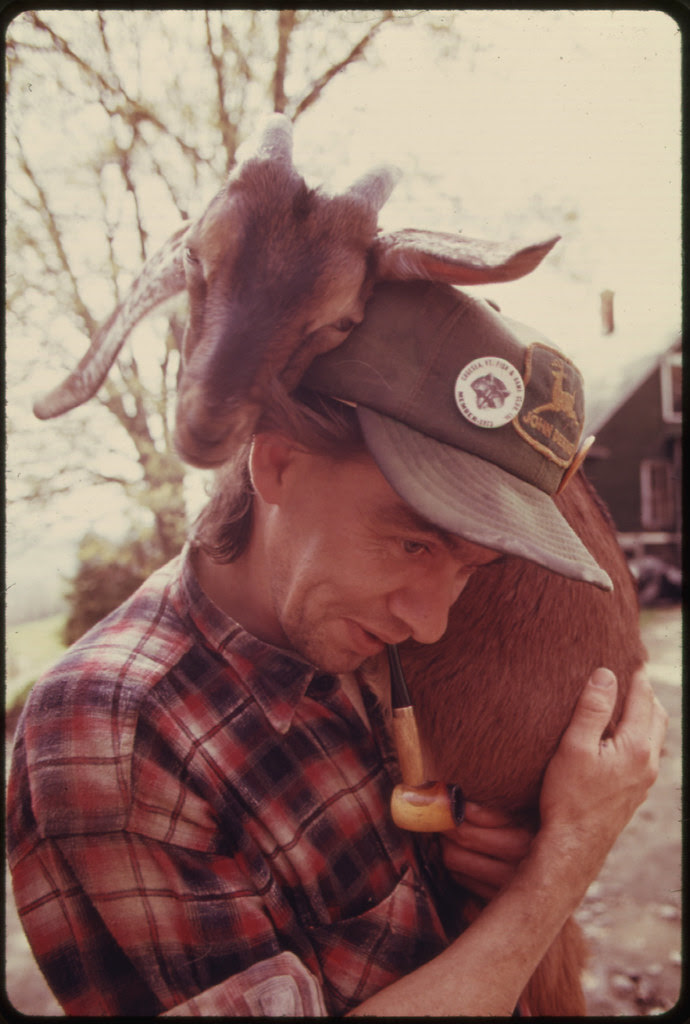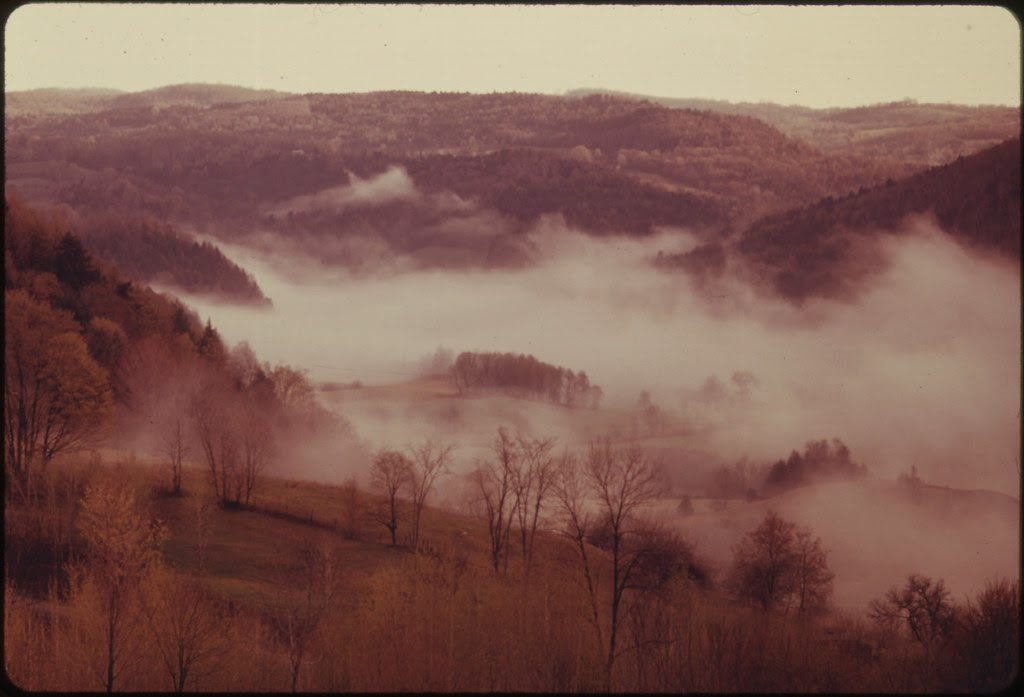.

This native of Randolph Center, Vermont, quit a Job as an auto mechanic to return to the family farm in hopes of keeping it running. In addition to Jersey cow milk, he and his mother sell goat's milk to private customers and a local nursing home: photo by Jane Cooper for the Environmental Protection Agency's DOCUMERICA Project, May 1974 (U. S. National Archives)
Am I the only one
my neighbour’s
frolicksome goat,
Ginger,
tied to a pecan tree?
All morning
it has been examining
an empty bushel basket
one leg delicately
like a circus horse
as if to roll it,
but whether to do that
or to butt it
with its small horns,
that is the question.
no signing of the Charter,
quickest of the elements.
Carl Rakosi (1903-2004): from Ginger, in The Collected Poems of Carl Rakosi, 1986

Early morning mist from a river carpets the length of the East Randolph, Vermont, valley: photo by Jane Cooper for the Environmental Protection Agency's DOCUMERICA Project, May 1974 (U. S. National Archives)

The village of East Randolph, Vermont, where buildings only change with the weight of years and heavy snows, is seen shortly after the dawn mist has risen: photo by Jane Cooper for the Environmental Protection Agency's DOCUMERICA Project, May 1974 (U. S. National Archives)

This woman lives on a dairy farm near Randolph Center, Vermont, that has been owned by the family for six generations. Low milk prices and increasing property taxes threaten her way of life: photo by Jane Cooper for the Environmental Protection Agency's DOCUMERICA Project, June 1974 (U. S. National Archives)

The surviving child of 13 offspring, this man has lived alone since his mother's death 25 years ago. He continues to run the family farm, and tends a herd of 30 Whitefaced cattle, plus four pigs and 15 dogs: photo by Jane Cooper for the Environmental Protection Agency's DOCUMERICA Project, June 1974 (U. S. National Archives)

Resident of Roxbury, Vermont, draws off the finished syrup from a homemade evaporator. Instead of working in a sugar house he sets up a makeshift rig in a new spot each year to use fallen timber and loose brush to fire the sawed-off oil drum: photo by Jane Cooper for the Environmental Protection Agency's DOCUMERICA Project, May 1974 (U. S. National Archives)
Viewer comments on above photo by Hred pics, 2010: "Looks like one of the Webster boys. They've all passed on now". "I showed this to a friend, she's pretty sure that's Curtis Webster. He lost the fingers of one hand in a railroad accident."

Uncharacteristically somber, this 76-year-old native of East Randolph, Vermont, finishes his morning's third cup of coffee. Since his legs went bad he is now able to do only small repair jobs. His work career Included that of a farmer, lumberjack, mechanic, ice cutter, hotel manager, professional chauffeur and handyman: photo by Jane Cooper for the Environmental Protection Agency's DOCUMERICA Project, June 1974 (U. S. National Archives)
Viewer comment on above photo by Hred pics, 2010: "Trust me, we are still living that way."
Who can say now,
“When I was young, the country was very beautiful?
Oaks and willows grew along the rivers
and there were many herbs and flowering bushes.
The forests were so dense the deer slipped through
the cottonwoods and maples unseen.”
Who would listen?
Who will carry even the vicarious tone of that time?
In the old days
age was honored.
Today it’s whim,
the whelp without habitat.
Who will now admit
that he is either old or young
or knows anything?
All that went out with the forests.
Carl Rakosi (1903-2004): The Old Codger’s Lament. from The Collected Poems of Carl Rakosi, 1986

This area Is known as Gay Hill near Stockbridge, Vermont. The farm was originally built in the 1800's by Ephraim Twitchell, the famous Vermont bridge builder: photo by Jane Cooper for the Environmental Protection Agency's DOCUMERICA Project, March 1974 (U. S. National Archives)



15 comments:
That reflection on a tethered goat might leads to that shining closing line of the first poem is remarkable.
From that ecstatic writing to the narrowing air of the second; deforestation of the mind.
Thanks, WB. There is surely that narrowing descent (felt here as well).
The first passage comes from a longish poem about that young goat.
It closes:
"I / felt myself being pulled / as by a line / from the invisible / other side / to enter goathood, / deeper than sight."
(An interesting -- broadening? -- revision of the meaning of "old goat"?)
I thought Jane Cooper's photos very beautiful and moving -- the landscapes, the passage of time etched into those weathered faces.
They are beautiful and tender.
really impressive collection of photos and poems!
i didn't know this poet... his words were close to my heart, though... especially what he said about "age":
In the old days
age was honored
and just this morning i was sadly thinking about this subject...
thank you, my dear teacher!
Nooshin, this poet, Carl Rakosi, lived to a great age -- and yet remained "young at heart" well beyond the point when most of us are long gone. I first corresponded with him in 1963; I was still wet behind the ears, he was already "old". Now, old myself, here, putting up his poems, I again feel his youthfulness of spirit.
And talking of poets worthy of the respect of all readers here, I hope you won't mind my sharing this -- in honouring your own work and spirit, and in memory of some of our exchanges in cyberspace "way back when":
Interview with Nooshin Azadi (Flashing By, 23 April 2011)
How beautiful all this is, Tom. A tribute to things that age . . . people, animals, and those ways of existence that “went out with the forests.” It reminds me that I’m never too old, nor is it ever too late to discover that someone else has distilled something beautiful out of the world.
Thanks old friend -- and yes, even in this deforested world there are these moments when the road curves off through fields of tall grass toward a horizon where the clouds seem to touch the sky...
... which I suppose isn't all that hard for them, as they're already afloat in it (the old man dithered).
"that is the question"
think his statement ending with the above phrase (in his "ginger" poem) reveals both his own playfulness and his philosophy of life... think he's showing us how one can live to be youthful like him... this seemingly simple poem is so deep!
such great people you had around you! i always feel sort of an envy toward people who lived their youthful years in 50's and 60's... i was born in 1965 and since my early teens i've been scavenging in the ruins of a once-precious civilization... fighting with or escaping from all sorts of lies, deceits, conceits and immorality... ending up a crow left of the murder! :D
and thank you for being such a selfless eagle, dear Tom, to fly in lower altitudes with crow...
listening to her caws!
you're a true poet... true poets live their poems...
namaste!
I guess it's possible there might be someone out there who hasn't seen this contemporary tribute to the frolicksomeness of the goat - so just in case ......
http://www.huffingtonpost.com/2014/02/17/goats-play-on-metal-sheet_n_4805908.html
Nooshin,
Talking of the poet's playfulness -- that lovely, endangered trait -- I hope you've been able to see the short video Barry's linked to...
Barry,
A fine time is certainly being had by those goats. Their skill at the game suggests it's not their first go-round. (I identified with the old billy-goat, I suppose -- not able to clamber up, but quite interested in head-butting the more adventurous ones, who've fallen off.)
Beautiful poem and photos. I love goats, love the air music--love the sentiments here.
Am reminded of my grandma's goat, which she kept on an island in Maine--it was always quick to eat your lunch if you left it on the rocks --or your hat
should he find it anywhere other than on your head.
You're right, Tom - there's a nice sense of group and age dynamics, alongside, as you say, a kind of playful essence of goatness. If we don't have a mountain-side to clamber and bounce around ....
Let's agree then -- everybody is, loves, and/or secretly wishes to be, a goat.
For those who wish to indulge this admirable element in human nature, there could be no better way than to spend the next few years wandering with and among the goats of a wonderful blogger in Norway, AJP Crown.
Crown is the Goat King.
We've been following with delight the fascinating doings of his goats for some time now -- since the days when they (if not we) were just kids.
yes... thanks to anti-filters, i could feed my inner "kid" by what you and Barry shared in the links...
:D
thank you!
Post a Comment